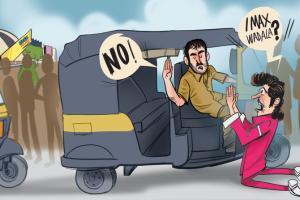The Mumbai Film Festival or MAMI Film Festival, as we call it, in auntyish slang, has just celebrated its 20th anniversary.

Illustration/Uday Mohite
 The Mumbai Film Festival or MAMI Film Festival, as we call it, in auntyish slang, has just celebrated its 20th anniversary. I have seen the festival's many avatars over the years. We have traipsed to various venues, from IMAX Wadala (you had to beg autos to take you there), YB Chavan and Ravindra Natya Mandir, to NCPA, Le Rêve and PVR at Icon, Citimall, Phoenix Mills and Kurla. The first decade was a simpler time, 'batata wada days' (Rs 10 for two), compared to today's strictly bookmyshow online ticket booking, when you need to shell out nearly Rs 500 for a Coke and popcorn.
The Mumbai Film Festival or MAMI Film Festival, as we call it, in auntyish slang, has just celebrated its 20th anniversary. I have seen the festival's many avatars over the years. We have traipsed to various venues, from IMAX Wadala (you had to beg autos to take you there), YB Chavan and Ravindra Natya Mandir, to NCPA, Le Rêve and PVR at Icon, Citimall, Phoenix Mills and Kurla. The first decade was a simpler time, 'batata wada days' (Rs 10 for two), compared to today's strictly bookmyshow online ticket booking, when you need to shell out nearly Rs 500 for a Coke and popcorn.
ADVERTISEMENT
I have been closely involved with the festival over the decades in various ways. I was International Cinema Programmer for the Mumbai Film Festival when Srinivasan Narayanan headed it, and had attended the Cannes Film Festival in 2009 to select films for the festival. I've also been moderator, doing three to four Q&As a day with international and national filmmakers and stars for over a decade, when Sudhir Nandgaonkar was Festival Director. The Q&As continued after, both for the festival and the Rendezvous with French Cinema, which was often a part of the festival. I was mentor on the festival's first Mumbai Young Critics' Lab in 2015, along with Peter Bradshaw, the Guardian's beloved critic. And, I am a part of Point of View, a non-profit that amplifies women's voices, that organised inclusive screenings of MAMI films, for the blind and sighted. We did 'audio description' of films for the blind, describing action when there is no dialogue, for Tu Hai Mera Sunday in 2016 and Turup (Checkmate) in 2017.
Can you die for cinema? Well, if the MAMI festival has given film lovers a life, it came close to taking mine away in 2010. I had gone an hour early for Alejandro Iñárritu's Biutiful with the sexy, melancholic, Javier Bardem. But, other Biutiful fans came for the previous film, then refused to leave the theatre. I was so suffocated in the horrific crowd in a small space where three theatres had their exits, I nearly died. But I lived to tell the tale, and even see the film.
One of my other, unforgettable experiences was when I did the Q&A for Jacques Audiard's A Prophet, if I remember right, for the Rendezvous with French Cinema in 2009. The film had won the Grand Prix at the Cannes Film Festival, and my heart was fluttering while doing the Q&A with the handsome Tahar Rahim. The paparazzi, asking us to pose for pictures after, shouted, "Come closer, please." I was too shy, but Rahim moved a discreet inch closer, very lightly put his arm around my shoulder, then stopped. "Zees is okay for your mariage?" he asked (he said ma-ree-aazh, as the French do). Hunh? I gasped. It took a moment for the penny to drop: he was checking if I would have trouble with a fiancé or husband, if any, if he placed his arm around me for a picture. Such a lovely, civilised man! Pas de probleme, I blushed.
Somewhere in the detritus of life, captured in millions of photos over the years, I hope I have a picture of us together. To cherish how sensitive men — and stars — can also be, especially now, in the time of #MeToo.
Meenakshi Shedde is South Asia Consultant to the Berlin Film Festival, award-winning critic, curator to festivals worldwide and journalist. Reach her at meenakshishedde@gmail.com.
Catch up on all the latest Crime, National, International and Hatke news here. Also download the new mid- day Android and iOS apps to get latest updates
 Subscribe today by clicking the link and stay updated with the latest news!" Click here!
Subscribe today by clicking the link and stay updated with the latest news!" Click here!






